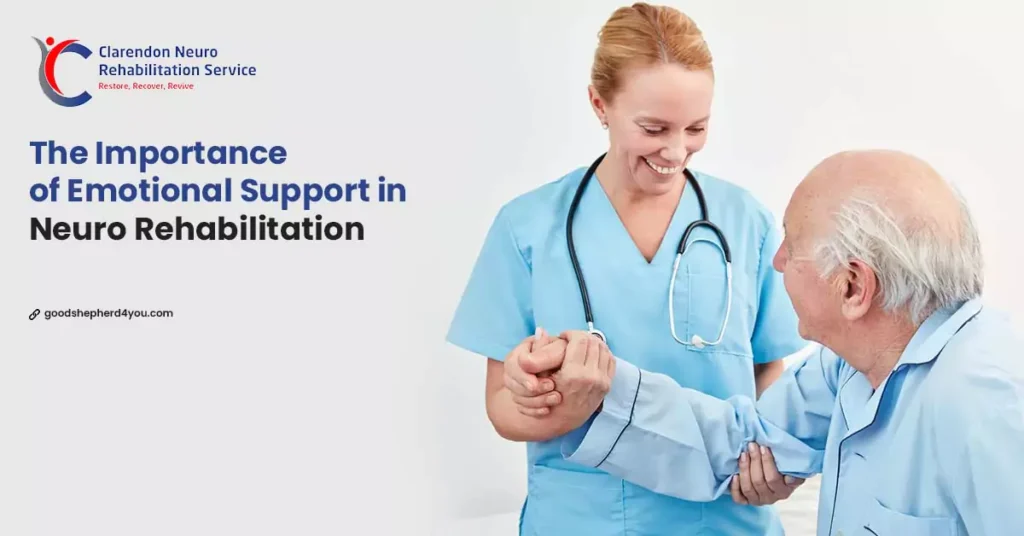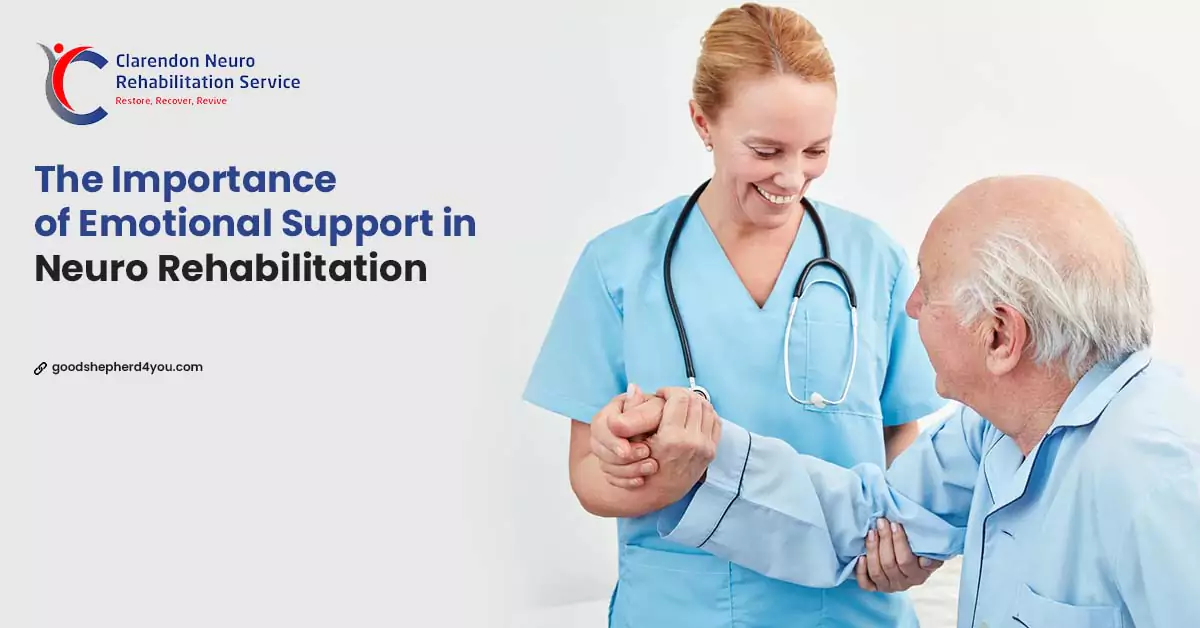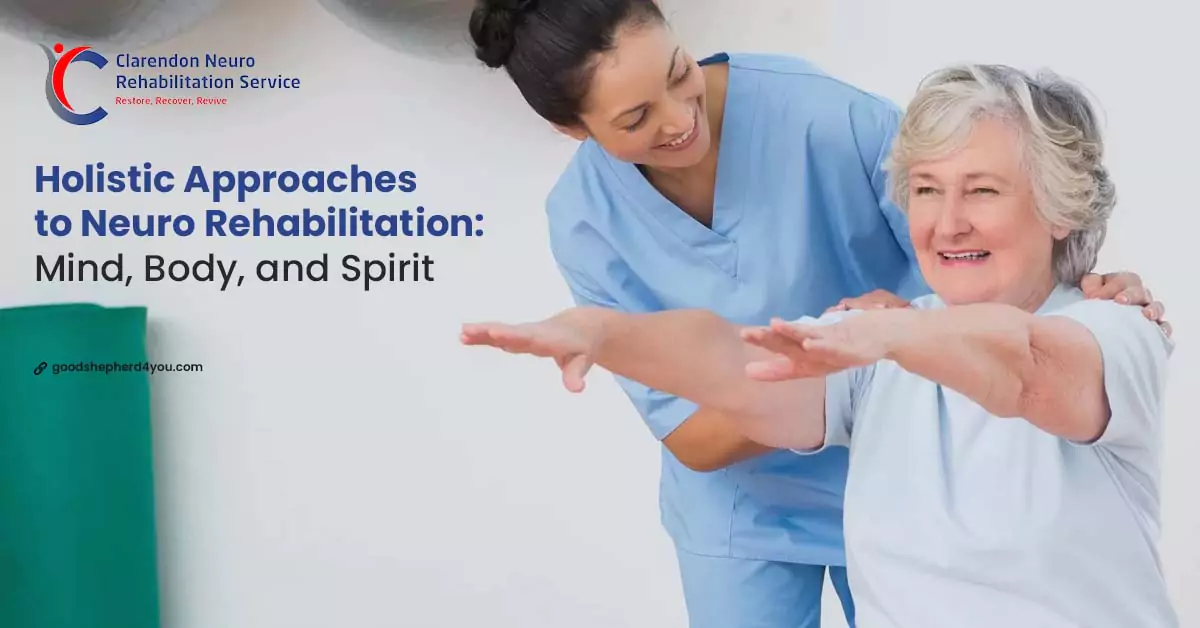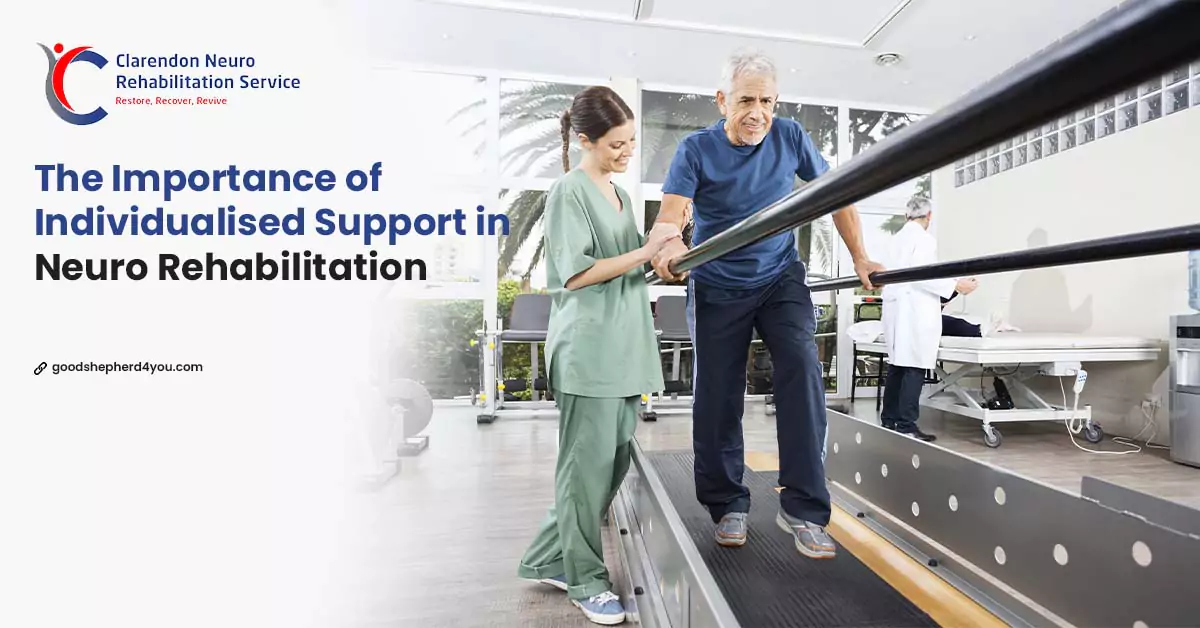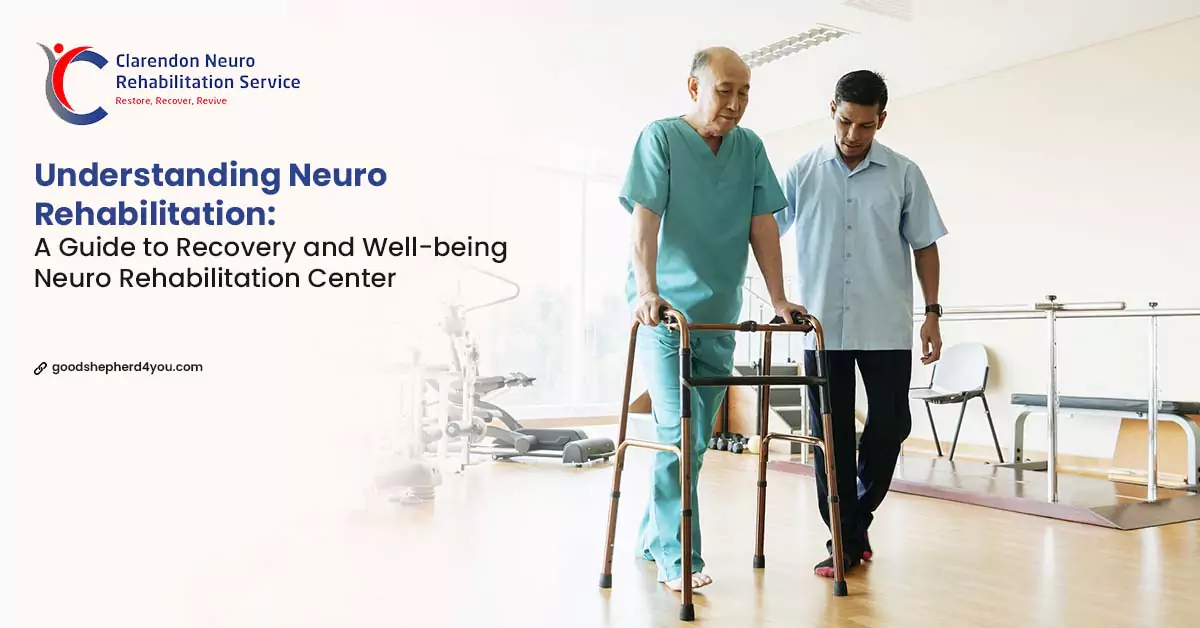In neurorehabilitation, emotional support is critical and forms the basis of a whole recovery. Emotional support in neurorehabilitation is a crucial point and plays a vital role in the recovery process. Patients who are under the harshness of neurological problems go through a roller coaster of emotions -one day, they are battling with neurological disease, and the other day, they need emotional support and a trustworthy shoulder they can lean on. Being able to help them in dealing with the anxiety and grief of this illness makes you a better and trustworthy person.
The process of rehabilitation is already draining, and it gets worse every day when you dont have a support system to look forward to. These difficulties can easily affect a Neurological patient’s mental health and physical well-being. Your support means the world to them.
Emotional support endorses reliability and empowers patients by providing a caring environment where they feel appreciated, heard, and encouraged. Furthermore, emotional support encourages social interaction and fills the isolation that neurological disorders mostly bring. This blog will explore how emotional support is a cornerstone in neurorehabilitation, facilitating a holistic recovery journey for patients grappling with neurological disorders.
Key Takeaways
- People who receive emotional support are more resilient, motivated, and engaged, making it easier to overcome obstacles.
- Different psychological complexities add up to the stress of neurological diseases. Patients who are already going through a rough path can’t deal with a psychological pause.
- So many emotions and feelings get triggered in patients who are dealing with neuro diseases, and it can get worse if they don’t open up in a timely.
- Stress, anxiety, frustration, depression and fear are the common factors that are present in most of the neuro patients, and if it doesn’t get addressed, it can slow down the process of healing.
- Neuro patients must express their feelings to their loved ones to overcome the hurdles of anxiety and depression.
- Emotional support facilitates social connection and lessens the isolation that is frequently felt when suffering from neurological diseases.
- Emotional support is integrated into the care continuum to improve patient-centred approaches.
- Different healthcare centres have programs that offer support groups for patients, where they can share their feelings and fasten healing both physically and emotionally.
- Getting emotional support makes patients active, and they tend to share things without hesitation or fear.
Implementation of Emotional Support in Neurorehabilitation
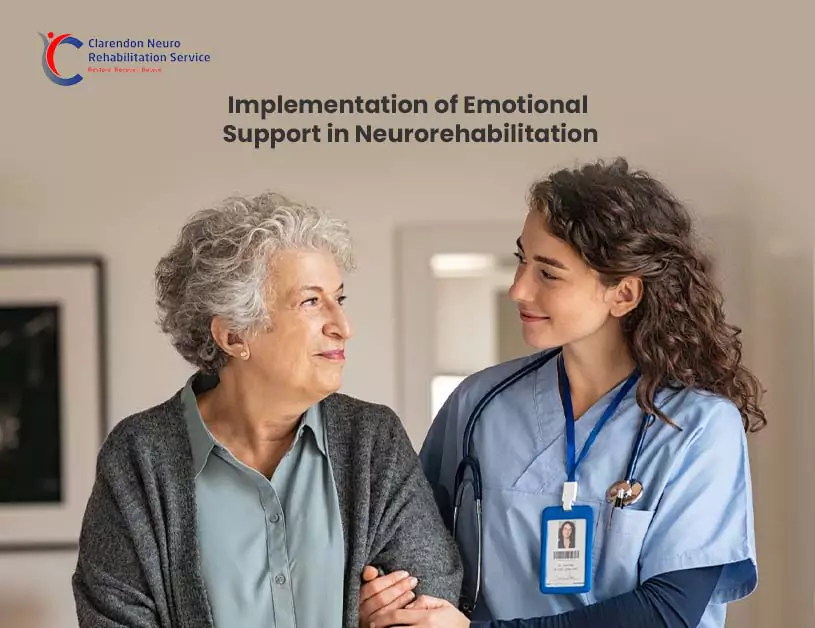
Emotional support must be implemented in neurorehabilitation. Through applying these techniques, medical professionals can establish a nurturing atmosphere that attends to the psychological requirements of patients receiving neurorehabilitation, encouraging adaptability, self-determination, and all-encompassing recuperation. The following are some successful ways to incorporate it into the recovery process:
Multidisciplinary Collaboration
Psychologists, social workers, counsellors, and rehabilitation specialists are just a few professionals from different disciplines who should be part of healthcare teams. Working together enables the creation of individualised support plans and a thorough assessment of patients’ emotional requirements.
Patient-Centered Care
Every patient’s distinct emotional journey must be acknowledged. Healthcare professionals ought to provide individualised emotional support interventions, affirm patients’ experiences, and actively listen to their patients. By learning about patients’ preferences and cultural backgrounds, providers can tailor care to each patient’s needs.
Psychoeducation and education
It’s critical to enlighten patients and their families about neurorehabilitation’s emotional components. Psychoeducational lessons on coping mechanisms, communication techniques, and stress management enable patients to navigate emotional challenges efficiently. Additionally, education lessens the stigma associated with patients’ experiences and encourages candid conversations about emotional health.
Supportive Environment
Establishing a supportive environment is essential in rehabilitation settings. It encourages open communication, empathy, and trust between patients, caregivers, and medical professionals. Peer support initiatives and group therapy sessions offer opportunities for emotional validation and sharing experiences, which can further strengthen social support networks.
Continuum of Care
Emotional support must be incorporated at every process stage, from acute hospitalisation to outpatient rehabilitation and community reintegration. After treatment, continuation of care and follow-up services are essential to maintaining mental health outside of the rehabilitation environment. Efficient transitions between distinct stages of care guarantee that patients have ongoing emotional support as they advance in their recuperation process.
Outcome Evaluation
Healthcare teams can regularly evaluate the efficacy of emotional support therapies and modify them as needed. Patient feedback, clinical observations, and standardised assessments can enhance emotional support, guaranteeing that interventions remain responsive to patients’ changing needs.
The Importance of Emotional Support in Neurorehabilitation
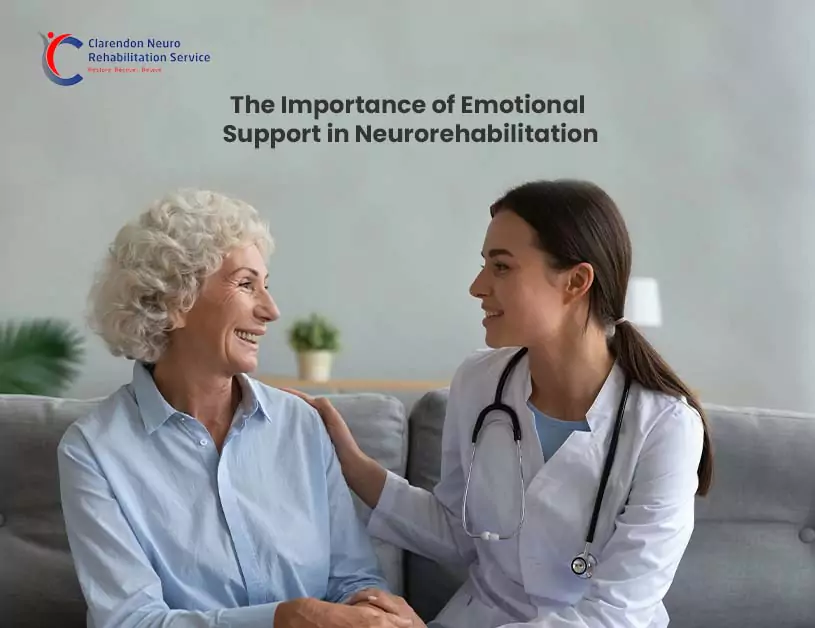
Neurorehabilitation is a generic term for enormous methods to help neurological disorders. It is a technique designed to make the lives of neuro patients functional again, and they can regain the life they once had. Neurorehabilitation has many aspects; it requires some medical treatment and therapies, making the patient poorly written, and they start losing hope. Emotional support becomes the only light of their life, and it holds significant importance in the lives of neuro patients. Emotional support is essential for addressing the psychological health of patients receiving neurorehabilitation since it provides a basis for a complete recovery.
Recognising the Emotional Terrain
In addition to affecting physical capacities, neurological illnesses like strokes, traumatic brain injuries, spinal cord injuries, and degenerative diseases also have an impact on cognitive ability and emotional wellbeing. Patients may feel like they are losing something—their identity, independence, connections, or work, for example—which can cause them to feel alone and sad.
Developing Motivation and Resilience
Patients who receive emotional support are more equipped to handle the difficulties that come with neurorehabilitation by having the encouragement, assurance, and coping mechanisms that they need. Emotional support enables people to endure setbacks, uncertainty, and gradual rehabilitation by promoting motivation and resilience. Pts who feel appreciated, understood, and supported are more likely to engage fully.
Reducing Tension and Encouraging Rest
Neurological disorders and the rehabilitation process can be pretty stressful. Emotional support reduces stress by offering a safe space for patients to communicate their feelings, voice their worries, and receive sympathetic answers. This emotional release helps to relieve stress and encourage relaxation, both of which are beneficial to recovery. Emotional support lowers stress levels, improves general wellbeing, and increases the efficacy of rehabilitative therapies.
Developing an optimistic mindset
Sustaining an optimistic perspective is essential for resilience and recovery. Patients who get emotional support can better maintain hope and self-determination in the face of hardship by building optimism, concentrating on attainable objectives, and recognising accomplishments. To advance neurorehabilitation, healthcare providers help patients create a positive mindset by acknowledging their emotional experiences and offering support.
Creating Social Bonds
Social networks can be disrupted, and neurological diseases can result in social isolation. Emotional support closes this gap by helping people connect with friends, family, medical professionals, and support groups. These relationships provide a feeling of understanding, solidarity, and belonging that lessens isolation and supports mental health.
Emotional Support With Good Shepherd 4 You

Emotional support is a crucial aspect of rehabilitation, especially for individuals navigating the challenges of cognitive and behavioural issues following brain injuries or neurological conditions. At Clarendon Neuro Rehab Service, our Specialist Units are tailored to meet the diverse needs of our clients. Within these units, a highly specialized multi-disciplinary team provides comprehensive nursing and therapy and a compassionate environment where individuals in the early stages of recovery can find solace and encouragement. Whether it’s the intensive care or the ongoing therapy, each client receives emotional support akin to that of a good shepherd guiding them through their healing journey.
FAQs
Emotional rehabilitation: what is it?
Ans. Emotional rehabilitation is the process of working through the agony of loss and getting back to a secure and healthy place. To get there and use resources to help move forward, a person must exercise the emotional muscles in her heart and mind.
What role does neurorehabilitation play?
Ans. Neurological rehabilitation frequently enhances function, lessens symptoms, and enhances the patient’s quality of life.
What stages go into healing an emotional wound?
Ans. Emotional healing is recognising, embracing, integrating, and processing intense feelings and traumatic life events. It might involve empathy, self-control, self-compassion, self-acceptance, mindfulness, and integration.
What difficulties does neurorehabilitation present?
Ans. Common concerns included an inadequate understanding of disability services, a shortage of personnel in Physical Medicine and Rehabilitation, regulations and accreditation standards, a lack of cooperation between healthcare sectors, societal issues, data and research, legislation, and political support.
Conclusion
Emotional support is essential to neurorehabilitation, which attends to patients’ psychological needs and promotes a comprehensive healing process. For those coping with neurological diseases, emotional support improves quality of life. It increases the efficacy of rehabilitation programs by promoting resilience, motivation, stress reduction, an optimistic attitude, and social connection. Acknowledging the value of psychological support in addition to physical therapy is critical to maximising results and enabling patients to take charge of their healing and adaptation.



